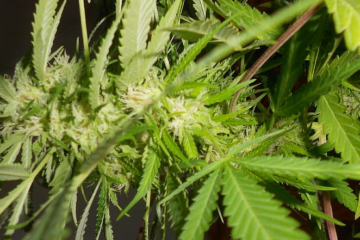A new study is giving fresh hope to eczema sufferers—especially those not thrilled about steroids. A topical cream containing cannabidiol (CBD) and cannabigerol (CBG) appears to significantly reduce itching and inflammation linked to atopic dermatitis, while also improving skin hydration and overall quality of life.
That’s according to a small, early-stage study published in the peer-reviewed Clinical, Cosmetic and Investigational Dermatology. Though it only involved nine adult patients, the findings are already raising eyebrows in dermatology circles for their potential to reshape how flare-ups are managed.
Itch, scratch, repeat: The eczema cycle is relentless
Atopic dermatitis isn’t just dry skin. It’s painful, stubborn, and can ruin a good night’s sleep in seconds.
It affects about 10% of adults in the U.S., according to the National Eczema Association. Many turn to topical corticosteroids, but long-term use has risks like thinning skin or hormone disruption.
In this study, researchers took a different route.
They gave participants a transdermal ointment packed with CBD and CBG. These compounds, derived from cannabis but non-psychoactive, are believed to have anti-inflammatory and antioxidant properties. Participants used the cream during flare-ups and also while in remission.

What actually changed? Skin metrics tell the story
Researchers weren’t just eyeballing redness.
They measured a bunch of stuff—hydration levels, sebum production, skin pH, and TEWL (transepidermal water loss, which is how much water your skin loses to the environment). The forearms were the focus area.
Improvements were seen across the board.
-
Skin hydration went up
-
Sebum levels normalized
-
Redness and itching dropped
-
TEWL decreased, meaning better moisture retention
One participant even experienced complete symptom remission. And that’s with no corticosteroids.
Nine patients, big implications?
Let’s be real: nine people isn’t a lot. It’s barely a dinner party.
But those nine cases weren’t cherry-picked. They represented a real mix of adults with mild to moderate AD, experiencing recurring flare-ups.
The study ran from May to July 2022. That’s peak summer, which can be brutal for eczema due to heat and sweat.
Still, the ointment held its own. Most participants reported feeling less itchy within days. By the end, many said they felt “noticeably more comfortable,” according to the study authors.
Just one sentence here: That’s not nothing.
Why CBD and CBG? And why now?
This isn’t the first time cannabinoids have been tested on skin.
CBD has been getting steady attention for a while. It’s been looked at for acne, psoriasis, and even pain relief. CBG is a bit newer to the scene but has shown some antibacterial potential, which could be helpful for preventing eczema-related infections.
What makes this different is the combo effect.
CBD works on CB2 receptors in the skin, calming inflammation. CBG may assist with sebum production and microbial balance. Put together, they could create a sort of 1-2 punch for eczema relief.
Here’s a quick snapshot:
| Compound | Source | Key Benefit | Psychoactive? |
|---|---|---|---|
| CBD | Hemp/Cannabis | Reduces inflammation | No |
| CBG | Hemp/Cannabis | Balances oil, may fight bacteria | No |
No THC here, by the way. No one’s getting high from this ointment.
What’s next? Larger trials, please
The authors were careful not to oversell their results. They called their work preliminary and stressed the need for broader clinical trials.
They’re right. There’s still no FDA-approved cannabinoid treatment for eczema. And while the market is flooded with “CBD skincare,” most of it hasn’t been rigorously tested like this.
Still, if future research backs these findings, cannabinoid-based creams could one day be a legit alternative to steroids or immunosuppressants—especially for people looking for gentler options.
Two sentences here to wrap this section: That could change lives. Literally.



